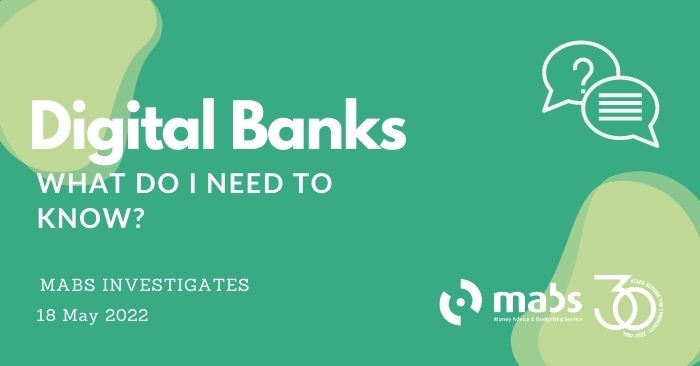Digital Banks – MABS Investigates

In MABS (Money Advice and Budgeting Service), we receive a lot of great questions about money matters and tackling debt. Questions that we know many people want to ask, but don’t know whom to ask or where to start. ‘MABS Investigates’ is here to help. In this series of blogs, we will answer these questions and “investigate” these topics, to bring clarity and break down the jargon.
The focus of this week’s ‘MABS investigates’ is Digital Banks, also known as, Disruptor Banks.
With the departure of KBC and Ulster Bank, a lot of people might be wondering what bank to use for their day-to-day banking needs. So, in this blog, we’re going to discuss digital banks, such as N26 and Revolut and answer questions such as:
- What is a digital bank?
- How does it differ from a traditional bank?
- Can I lodge a cheque or cash to a digital bank?
- I’ve heard there are difficulties transferring direct debits to a digital bank because of a non-Irish International Bank Account Numbers (IBANs).
- What are the fees and charges for digital banks?
- Why would I choose a digital bank over a traditional bank?
What is a digital bank?
A digital bank is simply a bank that operates primarily via an application (app) on your mobile device or by visiting a dedicated website online. They are sometimes called disruptor banks because they have “disrupted” the traditional way of banking. Examples of digital banks in Ireland are Revolut, N26, Money Jar and Bunq.
How does a digital bank differ from a traditional bank?
A digital bank is different from a traditional bank because a digital bank does not have a physical presence or branch. All banking facilities are offered and accessed through an app or online.
Can I lodge a cheque or cash to a digital bank?
No. Digital banks do not have branches or dedicated ATMs. You, therefore, cannot lodge physical money or cheques.
You can, however, have your wages or welfare payments lodged directly to your account using electronic fund transfer sometimes referred to as EFT.
I’ve heard there are difficulties transferring direct debits to a digital bank because of a non-Irish IBANs.
There does seem to be some resistance by Irish companies to use non-Irish IBANs (International Bank Account Numbers). However, if you are using Revolut (Lithuanian) or N26 (German), both are in the Single European Payments Area (SEPA). Refusing a non-Irish IBAN is not allowed under the SEPA. You can find out more about this on the Central Bank page for Non Irish SEPA discrimination.
Bunq, which officially launched in Ireland on 4 May, 2022, has a banking license registered with the Central Bank of Ireland. This means Bunq provide IBANs registered in Ireland.
Another Irish IBAN option is Money Jar. Based in Dublin, and around since 2018. The difference with Money Jar is a focus on mindful spending, using budgeting tools to help you with your money. Like Revolut and N26 they offer areas (Vaults, Spaces) where you can store money away from your balance to save for events such as a holiday or annual expenses such as insurance or car tax for example.
What are the fees and charges for digital banks?
As with any bank, the fees differ and there are different options available.
Revolut and N26 offer a basic free account where you don’t have a monthly fee. Bunq has a €2.99 monthly fee for its basic account and Money Jar charges €2.99 a month.
This information is correct at the time of publication. It is worth shopping around and reviewing each based on your situation. Some providers might offer discounts and exclusive offers.
Some digital banks offer premium accounts that come at a higher monthly cost but include fees you might incur on the basic accounts. You can find all the accounts and associated charges below
Why would I choose a digital bank over a traditional bank?
It is entirely down to the way you like to bank. If you primarily use contactless payments or want an effortless way to send payments to friends or family, then a digital bank will make sense. However, if you use cash and cheques and tend to pop into your local branch to bank then a digital bank would not match your needs.
Take a look at your bank statements to give you an indication of what you currently pay in fees. Do not just look at your monthly fee but for direct debits, ATM/cash withdrawals and even contactless payments. This will give more insight into both how you use your bank account and how you spend your money. Use this information to help you decide if a digital or traditional bank is the best fit for you.
Do you have a question for MABS to Investigate? Get in touch and let us know at mabs@ciboard.ie.
If you have a query for one of our advisers or are struggling with your debts, you can call the MABS National Helpline on 0818 07 2000 Monday to Friday, from 9am to 8pm or find the contact details for your local office.
Disclaimer: This blog does not represent legal advice and is intended for guidance only. If you are concerned about your current or future personal financial situation, then please contact an adviser from MABS. Advisers are available by phone and email.
Note: We welcome references to and use of the content in this blog. However, please reference MABS, and link said content if you choose to do so




Facebook
twitter
Instagram